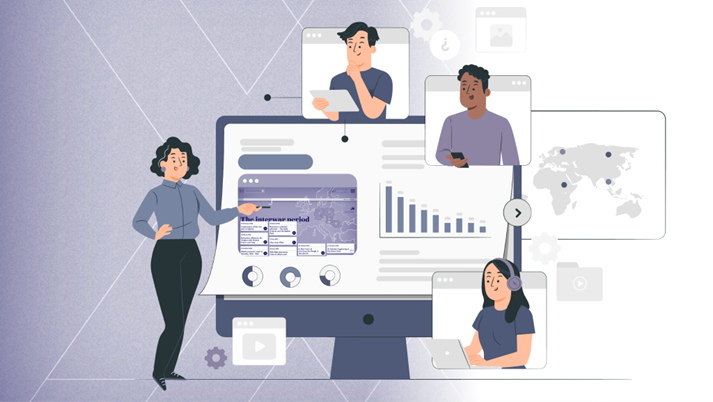How to talk about the Holocaust with modern teenagers? How to commemorate the memory Holocaust victims at school? As 27 January marks the International Holocaust Remembrance Day, a new educational package on the subject has just been published on the Hi-story Lessons portal. The lesson plans and ideas for commemorating Holocaust-related remembrance days developed by educators who specialise in the subject refer to such sources as a short animated film Memento and a travelling exhibition Between Life and Death […] focusing on various forms of aiding Jews during the Holocaust and stories of their survival. The materials are available in Polish and English at https://hi-storylessons.eu/sources/.
The new educational package includes three lesson plans and a teacher’s guide. The materials feature ready-to-use student’s worksheets, concise texts on the subject matter prepared by historians, as well as graphic content and links to recordings. The lessons conducted on the basis of the suggested scenarios will include questions on human nature, attitudes and mechanisms of people’s behaviour in extreme conditions, as well as the will to survive and the power of resistance against evil. The authors encourage the teachers to introduce the students to the Holocaust focusing on individual cases of those who have experienced it first-hand.
Consequently, the fate of Jewish children during the Second World War is exemplified by that of Elżbieta Ficowska, smuggled as a baby from the Warsaw Ghetto to the safe Aryan side in a wooden casket hidden in a pile of bricks. The students will have an opportunity to watch a moving interview in which she talks about her survival as a miracle.
Another lesson plan encourages adolescent learners to talk about various memorial sites related to the Holocaust understood broadly, not just monuments or commemorative plaques fixed on building walls but also gardens or squares named after Holocaust victims or artistic installations.
The new materials for teachers also evoke best practice in teaching about the Holocaust, such as the educational project Letters to Henio delivered in Lublin, showing the Holocaust using the example of a young boy Henio Żytomirski. The students discover his fate in the context of the daily life in the Polish-Jewish town of Lublin, and then write letters to him and put them into a letterbox.
The authors of the educational materials are: Martyna Grądzka-Rejak, Piotr Trojański, Maria Pawlak and Dominika Majuk. Their output includes four parts and tackles the following themes:
- The Different Ways Jews Were Helped during the Holocaust, a lesson plan: HISTORY LESSONS 1 27-12-22 (hi-storylessons.eu)
- The Fate of Jewish Children during the Holocaust as Exemplified by the Story of Elżbieta Ficowska’s Rescue, a lesson plan: HISTORY LESSONS 2 27-12-22 (hi-storylessons.eu)
- Commemorating the Victims of the Holocaust, a teacher’s guide on how to prepare school events to mark the International Holocaust Remembrance Day and other events commemorating the Holocaust: HISTORY LESSONS 3 27-12-22 (hi-storylessons.eu)
- Commemorating the Victims of the Holocaust, a lesson plan: Commemorating-the-Victims-of-the-Holocaust_lesson-plan.pdf (hi-storylessons.eu)
Read more about the authors:
Dominika Majuk has been working for over 15 years at the Grodzka Gate – NN Theatre Centre in Lublin, where she coordinates educational projects and permanent activities for the commemoration of Holocaust victims, as well as preparing and conducting educational workshops and seminars for students and teachers on local Jewish heritage, the Holocaust, the Righteous Among the Nations and Polish-Jewish relations.
Martyna Grądzka-Rejak, PhD, historian and educator, graduated from the Institute of History at the Pedagogical University in Krakow and the Department of Jewish Studies of the Jagiellonian University in Krakow. She currently works in the Warsaw Ghetto Museum as well as the Historical Research Office of the Institute of National Remembrance. Her research focuses on the history and culture of Polish Jews the Holocaust and wartime fate of Jewish women and families in particular. She has conducted research in the USA, Israel, Germany and Poland. She is the author of several articles and books.
Piotr Trojański, professor. He is an academic lecturer and academic advisor at the International Center for Education about Auschwitz and the Holocaust (ICEAH). He teaches at the Department of Historical Education, at the Pedagogical University of Krakow. He co-developed the first ever program of education about the Holocaust in Poland and co-authored the first handbook for the program. He is also the author and co-author of numerous publications concerning education about Auschwitz and the Holocaust, and perceptions of the Holocaust by Polish secondary school and university students.
Maria Pawlak historian, graduated from the University of Warsaw. Educator working with children, youth and teachers; Warsaw city guide. She cooperates with many institutions e.g. Polin Museum of the History of Polish Jews, Polish History Museum, Pilecki Institute, Forum for Dialogue, Center for Citizenship Education. She works at the Józef Piłsudski Museum in Sulejówek in the Education Department, where she coordinates the educational program for schools and kindergartens.
Hi-story lessons is a multilingual educational project with the aim of creating an interactive website, which supports the process of teaching and learning about the 20th-century European history. It is an international initiative prepared by the ENRS and experts from Germany, Hungary, Romania, Slovakia, the Czech Republic and Poland. The website is dedicated to teachers and pupils from the countries involved in the project and for a worldwide audience.
